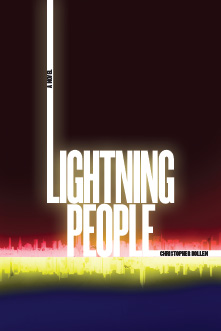[Soft Skull; 2011]
by Catie DiSabato
Christopher Bollen’s The Lightning People has an intriguing title and a familiar premise: a group of socially interlinked 30-somethings contemplate their lives and getting older in a post-9/11 New York City. Emotional darkness deepens the narrative, as Bollen uses a shifting close third person to bounce between the five central characters’ perspectives.
The momentum of the novel comes from its characters’ geographical desires: to either escape from or escape to New York City. New husband and wife Joseph and Del; Del’s best friend, Madi; Raj, Madi’s brother and Del’s former lover; and William, Joseph’s friend – are each immediately vivid; each voice feels different from all the others, while echoing similarly desperate situations. Unlike lesser character-oriented writers, Bollen manages to create lives that seem to have already been in motion before the book began.
Bollen does both Joseph and Del a service by introducing them on their wedding day and letting their complicated histories and motivations spool out slowly during the first half of the book. Although Madi gets less attention than some of the other characters, her direct and unpretentious voice is a refreshing contrast to those of the other, more inwardly-focused characters. A dramatic event that occurs about halfway through the narrative is both well timed and unexpected.
With the exception of that event, the narrative doesn’t rise away from familiarity often enough. Bollen’s characters feel like real people and the events in their lives seem authentic, but the Lightning People mostly lacks surprise. I don’t mean surprise like a sudden shocking plot twist – Bollen proves he can incorporate those to the benefit of the narrative – but small character surprises, small moments that feel honest, lines that give you a burst of insight. In a character-driven novel, these quiet surprises are often the key to compelling characters. Bollen doesn’t necessarily need to surprise the reader to compel him or her, but he doesn’t replace the lack of small surprises with anything equally gripping.
Bollen has moments of exceptional language; my favorite line is William’s direct and strikingly honest assertion, “Sometimes it was difficult not to take intimacy as a threat.” Unfortunately, Bollen’s language occasionally fails to reach the highs it shoots for. He occasionally tacks an unnecessary and unoriginal metaphor onto an otherwise excellently written line. Another of my favorites — “The work of mourning never gets finished, Joseph thought. There is always more work to be done” — is weakened when it appears again on the next page, slightly truncated: “The work of mourning never gets finished. There is always more to be done.” Bollen gives the impression he knew he had a gem on his hands, but instead of letting himself move on he grips the line too tightly, trying to increase the sentiment’s punch through repetition, which has the opposite of the intended effect. The second iteration doesn’t just sound forced, it weakens the first occurrence.
The most problematic character is William, a failed actor who begins the narrative two wrong steps away from devastation, then takes those steps. William’s storyline contains a few of the novel’s worst turns – several too-convenient coincidences and emotional tropes more in line with an episode of Law and Order: Criminal Intent than the rest of the novel. The Lightning People would be a leaner, more interesting novel without him.
To conclude William’s perspective, Bollen put himself in a position in which he could either write an ending that was improbable or one that was predictable (he chose to go with predictable), but the rest of the characters receive the emotionally nuanced endings they deserve. Bollen makes his second brave choice with the novel’s epilogue, choosing to move outside of New York City. Leaving the city, which was such a vital part of the fabric of the novel, gives the reader the space to contemplate the city Bollen’s characters so uneasily inhabited.
This post may contain affiliate links.









